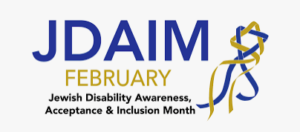Susan Lisker recently gave the following Drash (sermon) at Ohr Shalom Synagogue. This month is Jewish Disability Awareness, Acceptance and Inclusion Month (JDAIM).
By Susan Lisker

SAN DIEGO — The Parasha for this week is Tetzaveh. It means you will command (or order). The word is from the Hebrew root TZ(adik), V(av), H(ei). It’s also the root for Mitzvah which means commandment or good deed. This parasha follows Truma, which tells the Israelites what they need to bring as a contribution to build and decorate the Mishkan (the tent with the ark containing the stone tables with God’s commandments) and by extension the Temple to be built eventually in Jerusalem.
This Tetzaveh (order) begs the question, how are we to fulfill this commandment today?
We no longer have the Temple to adorn with beautiful fabrics and fine vessels made of copper, silver and gold. And yet we are committed to our Truma (contribution) obligation and to obeying this Mitzvah (order).
Maimonides, the great Jewish philosopher, in his Mishneh Torah included the eight degrees of contributing to help those in need. In his words, “the best way for a person to assist someone in need is by providing him with a gift, or a loan, or by accepting him into a business partnership, or by helping him find employment; that is by putting him where he can dispense with other people’s aid. This must always be done considering the feelings of the recipient.” As the Talmud says, “no giving at all is better than giving that humiliates.”
And Israel Al-Nakama goes even further by saying, “consider the sensibilities not only of the recipient but also the mental attitude of the giver.”
Over the centuries, Jews have found ways to follow this issue, by extrapolating the gifts to the Temple and turning their gifts to provide for synagogues all over the world. We see magnificent displays of art in paintings, wood carvings, silver adornments, silk and other fabrics beautifully embroidered, and other forms contributing to the enhancement of these houses of prayer.
But Jews go further to make this a better world. They have been actively involved in helping each other and helping others. They have contributed to building schools, hospitals, centers of recreation and learning, and synagogues.
They have contributed to improving the lives of their fellowmen by writing great works of philosophy, poetry, music, physics, mathematics, medicine, and other sciences and arts.
Today we also become involved in helping those who are less fortunate due to physical and mental disabilities.
I SHOULD KNOW.
I never actually saw myself as disabled. But I must admit, I am no longer what I used to be a long time ago, so I choose to tell people I’m speech impaired.
I used to be a simultaneous and consecutive interpreter. I could sit in a booth at a conference room listening to the words spoken in one language and interpreting, at the same time, into another language. I loved doing it. It gave me the opportunity to meet great, interesting people, while learning so much about whatever the subject matter was discussed or lectured. But that all ended when I was diagnosed with cancer of the tongue and needed the removal of my tongue so I could survive. I survived, but my career died.
After the surgery, I started on speech therapy. It helped somewhat but my speech didn’t improve. It actually worsened over time. I went everywhere with a notepad and a pen to write so I could communicate. I started speech therapy again about a year ago. My therapist is very patient and kind, and she even set me in a program to help people like me. I was provided with an iPad and a program, Proloquo4Text, that allows me to write what I want to say. I push a button and it “voices” my writing. It even “speaks” Spanish and English. It is a great help except for the telephone. It doesn’t work. And that is my major problem.
Everytime I want to talk to someone who doesn’t know me, they say I cannot understand you and hang up on me. It is terribly frustrating and discouraging. If I want to set an appointment, I need for someone to be kind enough and make the call for me, and many times I choose to go personally, if possible, to wherever I need to in order to do what I have to do.
And yet, looking back I feel I’ve been very lucky.
I survived. And because I survived and beat my cancer, I was able to take care of my mom. After she passed away, I was able to care for my husband.
But the real sunshine in my life have been my wonderful and handsome grandchildren.
I was able to be at their birth, brit mila, growing up to be the terrific young men they have become. I was at their bar-mitzvah ceremonies, proudly listening to their leining the Torah. And even with the restrictions of the pandemic, I was able to attend (via Zoom) their graduation from high school.
But even with their love and caring, it’s difficult for them to understand my speech. Sometimes I need to repeat myself twice, three or more times. So I must admit, however much I hate the notion, that I am disabled.
It makes me feel crippled, I don’t want to feel like that. I’ve tried to cope with my disability as best I can. But it’s always there.
And today I must thank from the bottom of my heart to my “interpreter” for reading my words. This person is one more link in the long chain of those who are following the Tetzaveh (order) commandment and contribute to make this a better world.
Thank you.
SHABBAT SHALOM